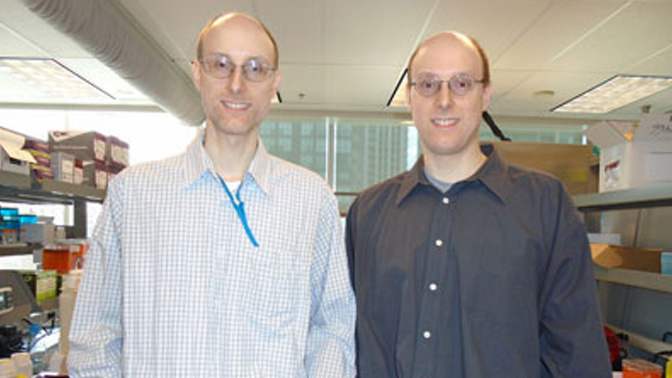Home page Description:
Study suggests that type 1 interferon fuels the development of obesity-related liver diseases.
Posted On: April 21, 2017

Image Caption:
Non-alcoholic fatty liver disease is a silent ticking time bomb: it has no symptoms and can progress unnoticed until irreversible liver damage occurs.
The accumulation of fat in the liver is a hidden health danger. Initially, it has no detrimental effect; but as the buildup grows, inflammation and irreversible scarring of the liver occur, leading to chronic liver disease. Researchers are still trying to solve the puzzle of how this process unfolds.
Gastrointestinal pathologist Dr. Shawn Winer and his twin brother TGHRI Scientist Dr. Dan Winer have been working to uncover the factors that control fatty liver disease development and progression. They recently used an experimental model of fatty liver disease to show that high-fat diets increase the levels of a proteins characteristic of a type 1 interferon response in the liver.
This increase drives the accumulation of specific immune cells (CD8+ T cells) that cause an imbalance in blood sugar levels—a common symptom of non-alcoholic fatty liver disease. Furthermore, when the Winer brothers tested certain compounds that interfered with the function of type 1 interferon in an experimental model of fatty liver disease, many of the negative symptoms were reduced.
These experimental results were further supported by the team’s clinical study, performed in collaboration with Saint Louis University Hospital, Washington University School of Medicine and Mid-American Transplant Services. The results of the study showed that increases in CD8+ T cells and type 1 interferon responses in the liver correlated with the clinical signs of non-alcoholic fatty liver disease as wells as worsened blood sugar levels.
This ground-breaking study highlights the important role that interferon plays in the development and progression of non-alcoholic fatty liver disease. The results also reveal a new therapeutic strategy: development of drugs capable of targeting type 1 interferon and related pathways may help combat obesity-related liver disease.
This work was supported by the Canadian Institutes of Health Research, the Canadian Diabetes Association, the J.P. Bickell Foundation, the Ontario Ministry of Research, Innovation and Science Early Researcher Award and the Toronto General & Western Hospital Foundation. D Winer holds a Tier 2 Canada Research Chair in Immunometabolism.
Ghazarian M, Revelo XS, Nøhr MK, Luck H, Zeng K, Lei H, Tsai S, Schroer SA, Park YJ, Chng MHY, Shen L, D’Angelo JA, Horton P, Chapman WC, Brockmeier D, Woo M, Engleman EG, Adeyi O, Hirano N, Jin T, Gehring A, Winer S, Winer D. Type I interferon responses drive intrahepatic T cells to promote metabolic syndrome. Sci Immunol. 2017 Apr 21. doi.org/10.1126/sciimmunol.aai7616

Dr. Shawn Winer, (L) gastrointestinal pathologist at St Michael’s hospitaland twin Dr. Dan Winer, Scientist, Diabetes Research Group in the Toronto General Research Hospital Institute (TGHRI) spearheaded lab work that has uncovered some of the key factors that control the development of non-alcoholic fatty liver disease . (Photo: UHN)




